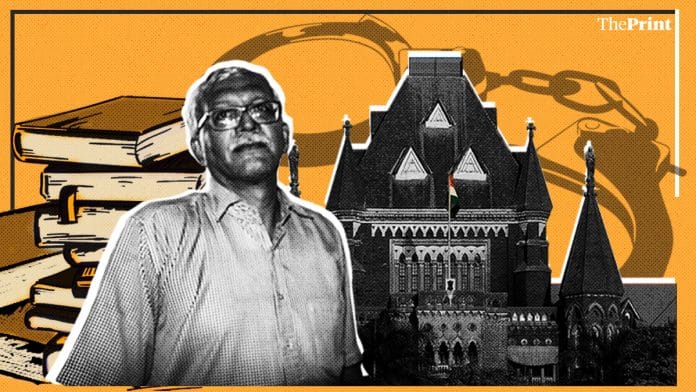A Bombay High Court judge reportedly questioned activist Vernon Gonsalves over keeping a book named ‘War and Peace’ at home. Justice Sarang Kotwal Thursday said his comment wasn’t meant for “Tolstoy’s book”. “I was reading the list of all books and CDs seized, didn’t mean all material was incriminating,” he said during a hearing of the bail plea of the activist arrested in the Elgar Parishad case.
ThePrint asks: Does War & Peace taunt show how poorly equipped Indian judges are to handle security cases?
Courts duty to ensure right to free speech, will be a worry if civil liberties become compromised

Justice A.P. Shah
Former Chief Justice of Delhi High Court
It is quite bizarre for a judge to have asked why a person has ‘War and Peace’ as part of their reading list. And it is even more shocking that the judge notes that because Vernon Gonsalves has this book, it is somehow indicative of his possible guilt in the Elgar Parishad case. The kind of books someone owns cannot indicate a person’s guilt. Courts are one of the most important institutions to ensure there is right to free speech in the country, and so it would be very worrying if civil liberties become compromised.
Right to free speech also includes the right to freedom of literature and the Supreme Court has consistently held that Article 19 (1) is the most fundamental and crucial right in the Indian Constitution. Currently, it is this right that is being eroded. One should hear Justice D.Y. Chandrachud’s Independence Day speech to see how closely art and freedom are linked.
On another note, there is also an existing concern over the selection of judges, and the collegium system of appointing judges in India is completely undemocratic and unaccountable. The selection process is done only by judges and lawyers, though mostly by judges. This process does not enquire about judges’ perception of the Constitution, about constitutionalism, about their own philosophies. It only enquires about technical aspects of the law. There is a desperate need to change the criterion for appointing judges in the country.
Urban Naxalism is a real threat to Indian society, and we are going to see many such attempts by Urban Maoists
 Arun Anand
Arun Anand
CEO of Indraprastha Vishwa Samvad Kendra, and author of The Saffron Surge: Untold Story of RSS
The alleged taunt about ‘War and Peace’ and the controversy that followed it does not reflect on the quality of judges. The judge in the question has already clarified that when he was referring to ‘War and Peace’, it was not Leo Tolstoy’s classic but a book about Maoist violence in West Bengal.
The controversy that erupted over this issue once again shows there is a large number of social media ‘activists’ ready to quote statements out of context and create a controversy where none exists. This was an attempt to take away the attention from the real issue, and the real issue here is that urban Maoist groups are operating in major cities and towns of India in the name of ‘civil society’. They had played a major role in orchestrating the ‘Bhima-Koregaon’ incident.
It is clear that by creating such controversies, the Urban Maoists are trying to take away the debate from the real issues. The real issue is that they support and promote use of violence and do not have faith in the Constitution of India. When the judiciary decided to take them to task, their propaganda machine decided to target the judiciary by raging such controversies.
The fact of the matter is that Urban Naxalism is a real threat to the nation and society, and we are going to see many such attempts by Urban Maoists to divert attention away from the real issues – even if it requires targeting the judiciary.
Also read: ‘War and Peace’ judge has made news before — with matrimonial cruelty & acid attack cases
Imperative for judges to be extremely careful in cases that involve questions of personal liberty
 Ishkaran Bhandari
Ishkaran Bhandari
Advocate
I don’t know if ‘War and Peace’ was the only material or if it was a collection of documents seized from activist Vernon Gonsalves’s home. Judges often consider every seized material put on record and not an isolated document. Their decisions have to be based on all the documents presented in the court.
It is imperative for judges to be extremely careful in cases that involve questions of personal liberty. The police too have to be more careful in building their case, especially when they are depriving a citizen of their rights.
Public prosecutors too need to be made aware of whether seized materials are incriminating or not. This onus lies on them too besides the judges. Unfortunately, appointments of public prosecutors are often politically motivated and not based solely on merit. The entire justice delivery system in India must be clear and transparent.
That said, the judge of the Bombay High Court hearing the activist’s bail plea only gave an oral remark, which should not be given undue importance. We must wait for the final order to come out, which would be in writing.
State can’t question an individual’s personal collection if there’s nothing in it that’s officially banned
 Saikat Majumdar
Saikat Majumdar
Novelist and Professor, Ashoka University
Books are political in the same sense every breathing minute of life is political. There is not a square millimetre of space anywhere that is not criss-crossed by the web of power relations. But great books always turn out to be much more than the attempt to achieve a particular political agenda. As time goes by, such books always transcend their original milieu.
Why would you keep a particular book at home? Coming from a judge, this question marks state authority with an infantile sort of confusion. How do you banish life from your bookshelf? How do you censor your mind against it? And great books aside, what about personal freedom? Even the right to consume pornography must be defended, provided it doesn’t demean any social group and does not abuse minors. And when it comes to art, the line between the great, the amoral, and the politically chaotic is always fuzzy and shifting.
Some of the greatest moments in the history of judiciary have been the delicate negotiation of this line. Think of the judgements over Joyce’s Ulysses or Chugtai’s Lihaaf. How can the state even question the contents of an individual’s personal collection, if it does not contain something that has been officially banned? Such a poorly thought out question only trivialises the image of the Indian judiciary.
Will we now have to wait for an official list of books and CDs that we can own?
 Ratna Raman
Ratna Raman
Associate Professor, Delhi University
Questioning someone for owning a book, irrespective of the title or author, shows an unfamiliarity with the role of books and literature in an individual’s life.
Reading books written in other cultures and geographies are always a valuable way to learn about them. Any adult has the right to own books of his or her choice. I have often worried about how people who study a five-year course on law know so little about so many things.
This is an unfortunate state of affair because reading books and watching CDs are integral aspects of learning. Judges deal with human lives and so should be sensitive to all contexts. An important aspect of security is a high degree of personal freedom. Another important aspect is the right to dissent. It is shameful that this judge is coming down so harshly on an important member of our society.
Possession of literature that could be ‘incriminating’ makes little sense to me because we live in a democracy. Does this mean that now we will have to wait for an official list of books and CDs that we can own?
The current political dispensation is constantly obsessing about world-class standards. This judge has lowered that bar abysmally.
This episode points towards a shift in viewing cases of national security. And judges are no exception
 Umar Khalid
Umar Khalid
Activist and Former JNU student
The statement by the Bombay High Court judge was quite shocking. However, to say that Indian judges are ill-equipped to handle cases of national security would be a huge exaggeration. But this episode points towards a shift in our society in cases of national security. And judges are very much part of that societal shift.
On the one hand, cases related to national security are politicised to meet vested interests of certain political parties. For example, in the Bhima Koregaon-Elgar Parishad case, all kinds of sensational letters were leaked at the time of the arrests of a few activists — including one that talked about a plot to assassinate Prime Minister Narendra Modi. But none of these letters, which made their way to TV studios, were ever produced in the courts. Such ‘media trials’ are an attempt to create a public opinion against the accused even before the judicial trials begin. Judges are also consumers of such fabricated news.
There has also been an effort to increase the government’s influence in judicial appointments. In 2015, a constitutional bench stalled the Modi government’s efforts to push through National Judicial Appointments Commission that gave the government greater powers in the appointment of judges. But the government changed the existing system giving itself the powers to reject the recommendation of the collegium if it felt the appointment of a particular judge could “jeopardise national security”.
When one considers these facts, it becomes evident that this puts enormous pressures on already overburdened judges in dealing with sensitive cases. However, I am confident that the judiciary will correct the wrongs done in the Bhima Koregaon-Elgar Parishad case.
Impact of popularising unhealthy rhetoric against people is getting reflected in how our justice system functions

Gurmehar Kaur
Author and Student Activist
I had to read the headline again when the news broke out because I couldn’t believe the absurdity of it. A Bombay high court judge was questioning activist Vernon Gonsalves about “highly incriminating evidence” as alleged by the Pune police. The material seized, a copy of ‘War and Peace’, led many to assume that it was in reference to Leo Tolstoy’s realist novel ‘War and Peace’ but people on social media later clarified that the judge’s remarks were in connection with the book ‘War and Peace in Junglemahal: People, State and Maoists’ instead.
However, the fact still remains that people cannot be incriminated for the kind of literature they read. What worries me and should worry everyone is that we are living in an anti-intellectual environment.
It shouldn’t be surprising that intellectuals and intellectual material will be seen with suspicion when Prime Minister Narendra Modi chooses hard work — of selling pakoras — over a Harvard education. At the same time, mainstream news channels spend hours forming a political rhetoric against Jawaharlal Nehru University students that they are anti-nationals — a term which was once used to label terrorists is now used for dissenting students. The impact of popularising such unhealthy perceptions is now seen in how some of the most important institutions delivering justice in the country function.
Also read: A year after Bhima-Koregaon clashes, here’s why the Maharashtra village erupted
Books are the new bombs in Naya India. There is a war now being waged on bookshelves
 Neera Majumdar
Neera Majumdar
Senior Copy Editor, ThePrint
Books are the new bombs in Naya India. There is a war now being waged on bookshelves. Of course, this is to bring peace.
The Bombay High Court couldn’t possibly understand why anyone would have a copy of ‘War and Peace’ in their bookshelves. It is about a war in another country, the judge reportedly argued. But so is the Ramayana, the battle takes place in Sri Lanka – another country.
Every regime wants to control what is read, so that it is not questioned. In Nazi Germany, they burnt 20,000 ‘un-German’ books in Berlin’s Opera Square (May 1933); books from the libraries in Baghdad were thrown into the Tigris River by the Mongols (1258); the Jaffna Public Library was burned down by the rampaging Sinhalese (1981); the Nalanda library was set ablaze by Khilji’s forces (1193).
What do we do now with the books we have stored in our homes? My ‘bunch of thoughts’ says we should be reading everything. That is the only way we will be thinking beings and not bots.
Yes, books are incriminating evidence of one thing – that Indians are reading.
It has been said that one of the reasons why the Soviet Union fell was because of a brilliant book called ‘One Day in the Live of Ivan Denisovich’ by Alexander Solzhenitsyn – it was about what was really happening in the Gulags. That’s the power of books, and that’s why they are the first to be censored, razed.
By Revathi Krishnan and Taran Deol







Hair splitting apart, intolerance levels in India are rising faster than the flood waters in many parts of the country. Freedom of thought and speech is under severe threat.
Not one of these distinguished columnists has bothered to learn what was said in the courtroom. The judge started out by saying that none of these books are banned. He asked a question about the book in order to understand the intent of the defendant. We don’t know how the defendant responded but he could have said that it is not about war in another country or that it is about a collection of essays about Maoists. Can somebody please post the complete transcripts so we we can decide for ourselves? We don’t need opinions by people who didn’t bother to research the issue but are ready to issue opinions.
Not really but it does show up the media’s incompetence and proclivity to bark up the wrong tree. Time media gets its act together and a grip on facts. This time it even confused a book.
If people are seeking alternate political ideologies, then it means the current form of political system, democracy or baboocracy is impotent to meet their basic needs of life. If basic needs are met, where is the need to turn to violence for remedy? Civilian baboos and netas have consistently failed those people for seventy years. What happened to the promise of a democratic India? The rulers have changed, the system of oppression still remains the same. Why are the people still poor? How come baboos and netas have become disgustingly rich beyond imagination? Is the state of India truly serving the lowly Indian citizen? Everyone knows it’s a sham. We just don’t want to face the inconvenient truth. Indians never attained freedom.
A complete aversion to intellect. What if Mao’s Little Red Book was part of the collection. For a nuclear armed power, we seem extraordinarily diffident about our ability to keep ourselves safe. The higher judiciary is turning a little ambivalent towards being a fierce protector of the freedoms of the individual versus an all powerful state.